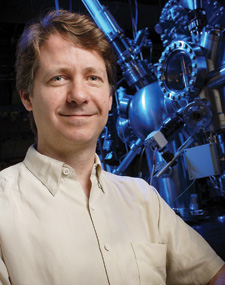The team that made the electron microscope tip is comprised of NINT principal investigator and physics professor Robert Wolkow, NINT research council officer and physics professor Jason Pitters, and Mohamed Rezeq, formerly of NINT.
The tip of an electron microscope emits electrons, or ions, instead of light, and these can be used to illuminate everything from cells to semiconductor chips. "Our new source of ions is really, really small," says Wolkow. "It's like we have a light bulb the size of one atom. And, it turns out that an ion beam emanating from a single atom has great advantages in terms of image resolution and depth of field and contrast."
Wolkow says the NINT nano-tip looks like an ordinary needle, unless you look closer, trying to see the very end of it - which you can't see, unless you were to look at it with another electron microscope.
The same tip is now the imaging source in a new holographic electron microscope built over the last couple of years at NINT. "We think it will reveal features of molecules and other nano-entities that can't be observed in any other kind of microscope," says Wolkow, who also notes that the team didn't set out to establish a world record. "We were just trying to make a better tool for our research," he says. "Having a world record is a fun achievement, but we are really interested in commercializing this product."
Although a world record wasn't the goal of the research team, Wolkow says he still takes pride in knowing that the record can't be broken. "Unlike some world records," he says, "the atomic sharpness of the tip means that the record can't ever be broken - one can't get sharper."
The other U of A Guinness record is for the Largest Game of Dodge Ball established in 2011 when 2,012 participants played in the U of A's Butterdome.

We at New Trail welcome your comments. Robust debate and criticism are encouraged, provided it is respectful. We reserve the right to reject comments, images or links that attack ethnicity, nationality, religion, gender or sexual orientation; that include offensive language, threats, spam; are fraudulent or defamatory; infringe on copyright or trademarks; and that just generally aren’t very nice. Discussion is monitored and violation of these guidelines will result in comments being disabled.